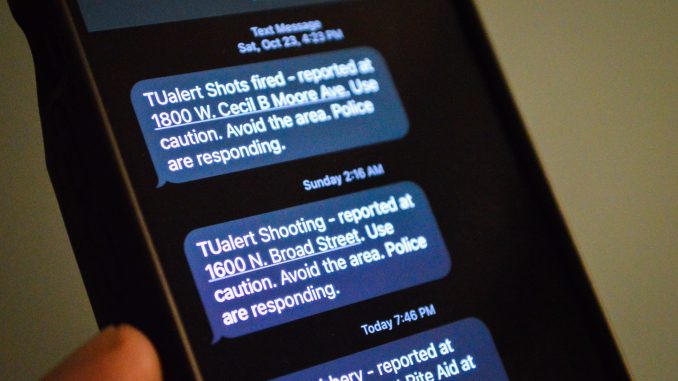
About 12 TUalerts, warnings sent to Temple University students via email or text that report on local crimes, like shootings and armed robberies, have been sent to students this academic year, which is an increase from 2020 when there was a decrease in campus crime due to the COVID-19 pandemic, leading The Temple News to examine what criteria calls for a TUalert to be issued.
A TUalert is sent when a student, property or member of the North Central community is at risk of being harmed, said Charles Leone, director of Campus Safety Services. Campus Safety Services sends out officers to confirm the legitimacy of a reported incident before issuing an alert.
“We are not just putting information out as soon as we get it,” Leone said. “We have to confirm that there’s a significant emergency or dangerous threat to health and safety.”
Not all crimes listed on Campus Safety Services’ crime log are sent out as TUalerts because some crimes are minor offenses that do not pose immediate harm to students, Leone said.
A report from a witness must be sent to Campus Safety Services before they send a police officer to the scene to confirm the validity of the report, Leone said. Leone, along with other members of Campus Safety Services leadership, then authorizes a TUalert, which is then sent to students, faculty and staff.
The criteria for what causes Campus Safety Services to send a TUalert has not changed during the 15 years that they have used them, Leone said.
As the campus population has grown, Campus Safety Services has expanded the area they patrol and the jurisdiction for TUalerts, Leone said.
TUPD patrols between Susquehanna Avenue and Jefferson Street, with the exception of 13th Street to Broad where the southern boundary is Girard Avenue, and between 9th Street and 18th, according to its website.
Other universities in the Philadelphia area use a similar notification system. The University of Pennsylvania uses the UPennAlert; Drexel University uses DrexelALERT; Thomas Jefferson University uses JeffAlert; and La Salle University uses the Rave Alert system to notify their communities of situations that could impact their health and safety.
The COVID-19 pandemic affected the amount of TUalerts sent out because many campus buildings were closed and students were in their own homes, Leone said.
“In 2020 we were probably at half the alerts sent, because most of the places were on lockdown for a long time, so there wasn’t much happening,” Leone said.
Jillian Stott, a sophomore speech, language and hearing science major, uses the Citizen app, a real-time neighborhood watch app, rather than TUalerts, which she believes are slower-paced.
The Citizen app is not always accurate and does not require confirmation before an incident is reported, Leone said.
Recently, a person using the Citizen app saw a report of a shooting outside the Lewis Katz School of Medicine and called Campus Safety Services. But upon review, the shooting did not actually happen, Leone said.
The Citizen app received negative attention after workers within the company cited that the company uses sensational methods in attracting more users, NBC reported.
Witnesses can report an incident for a TUalert by calling 911 or Campus Safety Services’ number while at the scene or showing video evidence if possible, Leone said.
TUalerts are sent out relatively quickly after an incident occurs, said Julia Budlow, a freshman undeclared major.
Budlow feels like the TUalerts encourage students not to be out late at night because a lot of alerts occur at night.
“It makes me feel like they’re paying attention to safety,” Budlow said. “They are paying attention to what’s going on around us.”
One of the best things students can do is give as much information as possible when issuing a report to Campus Safety Services, Leone said.
“The more information that we have, the better chances that we can to figure out what’s happening in a very short time,” Leone said.



Be the first to comment